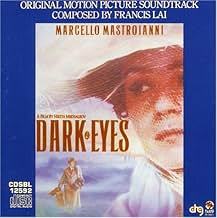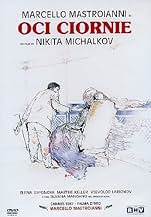IMDb RATING
7.3/10
3.7K
YOUR RATING
An Italian tells his story of love to a Russian. In a series of flashbacks, Romano Patroni leaves his wife to visit a spa where he falls in love with a Russian woman. He returns to Italy res... Read allAn Italian tells his story of love to a Russian. In a series of flashbacks, Romano Patroni leaves his wife to visit a spa where he falls in love with a Russian woman. He returns to Italy resolved to leave his wife and marry his love.An Italian tells his story of love to a Russian. In a series of flashbacks, Romano Patroni leaves his wife to visit a spa where he falls in love with a Russian woman. He returns to Italy resolved to leave his wife and marry his love.
- Nominated for 1 Oscar
- 12 wins & 22 nominations total
Elena Safonova
- Anna Sergeyevna, Governor's Wife
- (as Elena Sofonova)
Innokentiy Smoktunovskiy
- Il Governarore di Sisoev
- (as Innochentij Smoktunovskj)
Yuriy Bogatyryov
- Il Maresciallo
- (as Jury Bogatiriov)
Dmitriy Zolotukhin
- Konstantin
- (as Dimitri Zolothuchin)
Jean-Pierre Bardos
- Ospite sdraiato
- (as J. Pierre Bardos)
Elguja Burduli
- Il cuoco della nave
- (as Elgugia Burduli)
Pierluigi Cervetti
- Il maestro di ginnastica
- (as P. Luigi Cervetti)
Featured reviews
There are many wondrous qualities to this movie, especially the performance of Marcello Mastroianni. I only want to mention one scene, my favorite. It occurs when Romano (Mastroianni) arrives by train in the Russian village of Sisoev where he is to set up a glass factory.
Upon de-training all he sees is a peasant woman with a cow. Suddenly, on the other side of the tracks a band plays. Romano walks across the welcome-carpet to a crowd of townspeople giving him a raucous reception. Actually folks here want the factory for themselves . The Italian is offered Russian bread to sample. Young girls bear doves and present the man with wreaths. The mayor recites a poem and gives a welcome speech. A medal is bestowed. Kisses galore are planted.
Singers and balalaika players appear. Caviar and lethal vodka is thrust upon the man, who is barely able to cope with its potency. It's a distillation (pun intended) of Russian-ness which overwhelms the guest as he is conducted by carriage to his hotel and carried in, tired and soused, later muttering "Sabatchka," the name of the little dog belonging to Anna, the Russian girl that has aroused his passion. Great, great!
Upon de-training all he sees is a peasant woman with a cow. Suddenly, on the other side of the tracks a band plays. Romano walks across the welcome-carpet to a crowd of townspeople giving him a raucous reception. Actually folks here want the factory for themselves . The Italian is offered Russian bread to sample. Young girls bear doves and present the man with wreaths. The mayor recites a poem and gives a welcome speech. A medal is bestowed. Kisses galore are planted.
Singers and balalaika players appear. Caviar and lethal vodka is thrust upon the man, who is barely able to cope with its potency. It's a distillation (pun intended) of Russian-ness which overwhelms the guest as he is conducted by carriage to his hotel and carried in, tired and soused, later muttering "Sabatchka," the name of the little dog belonging to Anna, the Russian girl that has aroused his passion. Great, great!
This Russian-Italian co-production from 1987 finds two older men, one Italian, the other Russian, talking in the empty dining hall of a slow ocean liner. The Italian tells his story in flashback, as we see him fight with his rich wife, which sends him to a health spa to recuperate, where he meets a bored, young and beautiful Russian woman who is herself unhappily married. After many overtures toward a romance, the Russian wife flees back home, and the Italian follows her, ostensibly on business, but truly in hopes of sparking the romance further.
The film is gorgeously photographed, and much attention is paid to costume and set design, as well as delicate color schemes. Marcello Mastroianni received his final of three Best Actor Oscar nominations for this, and he's wonderful as usual. Silvano Mangano plays his wife, and Marthe Keller appears as a family friend. I wasn't familiar with the Russian leads, Elena Safonova and Vsevolod Larionov, but they are fine as well. The story drags a bit in places, and lengthy passages of Russian without subtitles started to detract after a while (I'm not sure if this was the fault of the print I watched, or if it was intentional, to show the language barrier faced by Mastroianni's character).
The film is gorgeously photographed, and much attention is paid to costume and set design, as well as delicate color schemes. Marcello Mastroianni received his final of three Best Actor Oscar nominations for this, and he's wonderful as usual. Silvano Mangano plays his wife, and Marthe Keller appears as a family friend. I wasn't familiar with the Russian leads, Elena Safonova and Vsevolod Larionov, but they are fine as well. The story drags a bit in places, and lengthy passages of Russian without subtitles started to detract after a while (I'm not sure if this was the fault of the print I watched, or if it was intentional, to show the language barrier faced by Mastroianni's character).
Based (loosely) on Chekhov's story "The Lady With The Little Dog," Oci Ciornie (Dark Eyes) features some of the most sumptuous photography of recent years. Set in Yalta, a sultry Black Sea spa for stylish Russian idlers, Dark eyes features a memorable tragic-comic performance by Marcello Mastroianni as Romano, foolish, gallant, ultimately trivial, and a superbly innocent, deeply moving performance by Yelena Safonova as the woman whom he utterly, shamefully fails. Mikhalkov's script departs from the Chekhov story in ways that some Chiekhov-loving viewers might balk at. But Chekhov's ending is perhaps too subtle and introspective for cinematic realization, and Mikhalkov's alternative, seems justified, if only as a vehicle for Matroianni's extraordinary performance.
A Russian/Italian co-production sounds like an uneasy marriage of mismatched temperaments, but 'Dark Eyes' is a remarkably cohesive mutual effort offering the best of both worlds: a wonderfully romantic story, a healthy love of laughter and high spirits, and a lingering air of Slavic melancholy. It's being sold as a showcase for the perennial charm of Marcello Mastroianni, but the film has more than just his performance to recommend it. The script, condensed from several tales by Anton Chekhov, has the elegant simplicity of a classic short story, following a charming but buffoonish husband in his pursuit of an attractive young Russian back to her native country, where he discovers a nation of people even crazier than he is. Some of the smaller roles have been drawn for the broadest effect, but under Nikita Mikhalkov's meticulous direction every character emerges as a full blooded human being, with Mastroianni himself offering a sensitive portrait of a man too in love with life to take it seriously. A nagging reservation: the final irony revealed in the epilogue adds one coincidence too many, and comes close to spoiling the already poignant mood. Just pretend it never happened.
10adipocea
There's no really much you can say and analyze about this movie. It's not a movie by itself, it's a piece of art lost in the ocean of mundane cinema of the 20-th century. It's like the great literature, the great paintings of history, impregnated with a mystical and hard to define quality in it's texture. For me this is not simply a "movie", i say it again. Like Nostalghia or Andrei Rubliov of Tarkovsky , here the poetics transcends what we usually call cinema, or a film, because it gets a life on it's own, and becomes independent to critical observation. It's like a tiger in the Siberian forest, that you have to simply admire. A tiger is beautiful because it's a tiger, Oci Ciornie it's beautiful because it is Oci Ciornie. Something divine happened to Mihalkov and to the cast when thy made this piece of art. It was the greatest shame and scandal when the jury at Cannes awarded "Sous le Ciel de Satan" the Palme D'or, but who cares...Time is for the art what is for the wine. The good one gets better, the cheap one gets sour and becomes vinegar.
Did you know
- TriviaFinal film of Silvana Mangano.
- SoundtracksSonata per pianoforte n. 17 in Si bemolle maggiore, K. 570
Composed by Wolfgang Amadeus Mozart
Performed by Laurent Ferlet
- How long is Dark Eyes?Powered by Alexa
Details
Box office
- Gross US & Canada
- $2,201,428
- Gross worldwide
- $2,201,428
- Runtime1 hour 58 minutes
- Color
- Sound mix
- Aspect ratio
- 1.85 : 1
Contribute to this page
Suggest an edit or add missing content
































